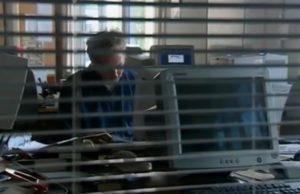- Polls apart - 4th March 2026
- Repeating on you… - 4th March 2026
- History man - 3rd March 2026
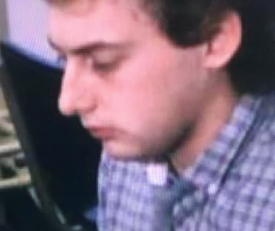
During 23 years with the BBC, and in a 41 year journalistic career (when he was trained to use clear and simple language, avoiding jargon), for our Editor, Welshman Phil Parry, an independent and free media reporting uncomfortable truths about individuals or organisations has always been pivotal, with this now emphasised by a new film released next month about murdered Russian investigative journalist Anna Politkovskaya.
The sort of investigative journalism I undertake isn’t always easy, but at least the main worries are receiving a libel writ, or getting abused on the internet, not of actually being killed.
For others though, it is different because they have paid the ultimate price and I salute their bravery.

Take for example Anna Politkovskaya who reported on political and social events in Russia, in particular, the Second Chechen War (1999–2005).
Ms Politkovskaya was arrested by Russian military forces in Chechnya and subjected to a mock execution, after this she was poisoned while flying from Moscow via Rostov-on-Don to help resolve the 2004 Beslan school hostage crisis, and had to turn back. On October 7 2006 (the 54th birthday of Russian president Vladimir Putin), she was murdered in the elevator of her block of apartments. In 2014, five men were sentenced to prison for the murder, but it is still unclear who ordered or paid for the contract killing.
Now a new film about her is on the point of being released. Already out in America and released in the UK in June, ‘Words of War’ opens in 2004, when Ms Politkovskaya (played by Maxine Peake) was poisoned en route to the hostage crisis.

It spools back to depict her coverage in Novaya Gazeta (a beacon of independent journalism), of the Chechen war which began in 1999 and oiled Mr Putin’s ascent. She reported unflinchingly on torture, massacres and forced disappearances, incurring surveillance, assaults and threats.
‘Words of War’ focuses on three key relationships. One is with Dmitry Muratov (Ciarán Hinds), her Editor, who in 2021 would win the Nobel peace prize. A second is with her husband (Jason Isaacs) and anguished children. The third is with Mr Putin himself, a spectral presence whom she denounces as “a vain, brutal, power-hungry authoritarian”.
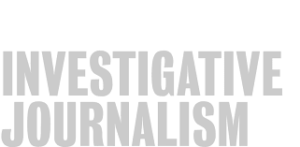
Ms Politkovskaya had a hunch (although this isn’t in the film) that some Russian spooks had enabled the Beslan attack, a view which was not, to her, a conspiracy theory but a plausible scenario.
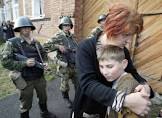
The film captures her moral clarity, bravery and mordant wit, and conveys her belief that, against the odds and the ruthless enemies she made, her work could make a difference (as I like to think mine does).
But she is not alone in suffering grievously for being a trouble-making investigative journalist.
There’s Mukesh Chandrakar, who was a freelance one in the Chhattisgarh state of India, and reported on alleged corruption in the construction industry on his YouTube channel, Bastar Junction.
Police found his body in a septic tank in the state’s Bijapur district on January 3 – he had suffered blunt-force injuries to his head and ribs, had a broken neck and his heart had been ripped out, India Today reported.

Mr Chandrakar’s death is said to be linked to a recent investigation into a road construction project in the Bastar region, which led to a government investigation. Four people have been arrested, including three of his relatives.
Before this appalling incident, the investigative journalist Jeff German was murdered by former Nevada politician Robert Telles. Mr German had covered the area for 40 years. Most recently, he had worked as a reporter on the investigations team for the Review-Journal. He also contributed to the newspaper’s true crime podcast, ‘Mobbed Up’.
His target, Telles, had lost his primary re-election bid, after Mr German had reported allegations of bullying (which has been levelled at me), favouritism, mismanagement, and an “inappropriate relationship” with a staffer. Mr German was found stabbed to death at his home, with Telles detained by armed police officers, and in August he was found guilty of first degree murder.
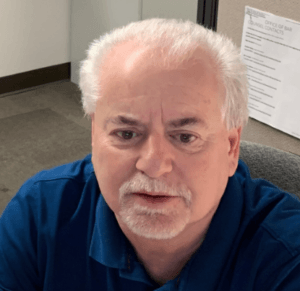
In 2018, the Committee to Protect Journalists (CPJ) listed the names of 58 journalists who had been killed. Late last year the CPJ said that 64 journalists have been killed since October in Gaza alone.
I would never pretend to be in these people’s league for their bravery, and adherence to bringing out the truth, but there are worrying parallels.
For example, insults such as “He’s a bully” and “he’s obsessed with me” which Telles said about Mr German, are also words that have been hurled at me.

The editorial cartoonist at the paper he worked on, published an illustrated tribute to Mr German, calling him, “one of the finest investigative reporters in the country. His job was to shine the light on the darkness”. The mission statement of my website, The Eye, is: “Finding Light in Darkness”. A threat has also been made on social media.
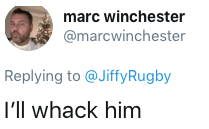 After it was said that my reporting was “negative journalism”, a Marc Winchester, wrote on Twitter/X: “I’ll whack him (me)“. This was described as a ‘joke’ by Mr Winchester, who has claimed he was a multi-millionaire but ran a convenience store, yet it was still reported to the police who mounted an investigation.
After it was said that my reporting was “negative journalism”, a Marc Winchester, wrote on Twitter/X: “I’ll whack him (me)“. This was described as a ‘joke’ by Mr Winchester, who has claimed he was a multi-millionaire but ran a convenience store, yet it was still reported to the police who mounted an investigation.
I have (almost) become used to the abuse I am forced to endure, with the words ‘bully’, or ‘bullying’ often wheeled out online.

The latter was seized on, for example, in response to a piece I wrote concerning a television ‘reporter’ who had posted pictures of herself on social media in skimpy clothes, and is typical of the insults I constantly receive. This was the obnoxious pronouncement: “Your article on Ellie Pitt was bordering on mysogynistic bullying, a really pathetic article written by a bitter individual who was a complete failiure as a BBC correspondent and also loved bashing the Catholic Church with your disgraceful Panorama programme”.
Then there’s ‘obsessed’ or ‘obsessive’.
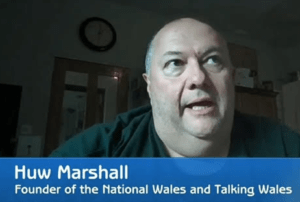 The ‘comedian’ and failed media executive, Huw Marshall, likes to accuse me of those things, in his tirades condemning items I have written about his extraordinary exploits. He has used Twitter/X to say that I am an “obsessive coward”, linking the inaccurate comment to a piece I had published about one of his unsuccessful ventures.
The ‘comedian’ and failed media executive, Huw Marshall, likes to accuse me of those things, in his tirades condemning items I have written about his extraordinary exploits. He has used Twitter/X to say that I am an “obsessive coward”, linking the inaccurate comment to a piece I had published about one of his unsuccessful ventures.
Mr Marshall has declared, too, that he has a number of different Twitter/X accounts, but says he reserves one for articles which may bother me, saying: “@marshallmedia is where I post Everton related stuff and things that upsets Phil Parry”.
Remarks like these are, though, unfortunately par for the course, and a regular part of life for an investigative journalist like me, Mr German, Mr Chandrakar, or Ms Politkovskaya. I endure constant abuse online, and my Wikipedia entry is regularly vandalised.
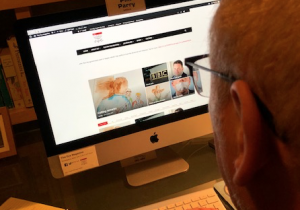
In one a person took out: ‘…online investigative website…’, and added: ‘…personal blog called…’. Bizarrely, though, in the ‘career’ section, it still said: ‘…launched his own investigative website “The Eye”…’. This may sound insignificant, but actually it is VERY important, because it effectively says that a story does not contain facts at all, but is a ‘personal view’, and I am glad to say the new addition was quickly spotted, so that the entry could be put back to its original form by one of my supporters.
Other attacks have been cruder – for example in the past the word “knobhead” has been added after my name. I have been compared on Twitter/X to the comedy broadcaster Alan Partridge by a Sion Tomos Owen whose blog describes him as: “…a bilingual TV and Radio presenter, illustrator, writer and creative workshop tutor…”. Mr Owen said in Welsh: “There’s no way that this website (The Eye) is for real?! It’s as if a Take a Break (light magazine) story has been edited by Alan Partridge” (laughing emoji).
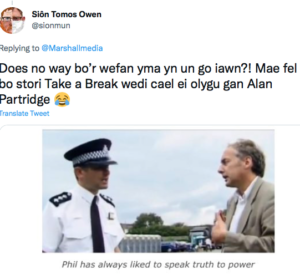 Mr Owen’s comment follows a familiar pattern, and accusations of being ‘misogynistic’ or ‘misogynist’ are a constant line among those who fire off offensive comments, if factual stories are published with the focus of them happening to be women, yet these are potentially libellous words, and the description is provably wrong.
Mr Owen’s comment follows a familiar pattern, and accusations of being ‘misogynistic’ or ‘misogynist’ are a constant line among those who fire off offensive comments, if factual stories are published with the focus of them happening to be women, yet these are potentially libellous words, and the description is provably wrong.
I have also been accused online (incorrectly) of being a “bastard” (many times), an “anti-devolutionist wanker”, “pure scum”, a “liar” (also many times) a “little git”, and (correctly) a “nosey git”, “irritating”, or a “nuisance”. But these come amid many others. Too many, in fact, to mention.
A conman I exposed launched a furious diatribe against me – contacting as well my friends and family on social media. In one rant he wrote on FB: “You write total lies about people (only facts are reported), bully to the point of harassment and suicide, and will not answer a direct email? This is not journalism this is a mixture of Phil Parry (The ex journalist) and (others) you are pure scum!!!!! Let it be publicly known that The Eye does NOT care about people it just lies to make fictitious stories up. BULLYING, LIES, MENTAL HEALTH ABUSE TO NAME BUT A FEW!!!!!”.
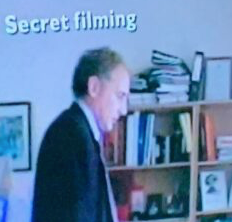 In another he said: “I am have contacted you (sic) numerous times before asking why you consistently, stalk, bully and harass me? … You so far have asked the following for comments:
In another he said: “I am have contacted you (sic) numerous times before asking why you consistently, stalk, bully and harass me? … You so far have asked the following for comments:
Thief
Abuser (if this is meant as a sexual abuser, it has never been said).
Liar
Sex Offender (It has never been said that this man is a sex offender).
Drug user (It has never been said that this man is a drug user, just that he has dealt in illegal drugs).
But these are not the only events of note. I have visited one individual at home who I was effectively accusing of murder, when the door I came through was bolted behind me.
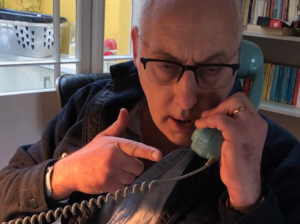
In the past I have had to have a security expert give me advice about keeping my movements irregular, and my house has been wired for intruders, with panic buttons installed at the bedside and in the hall. We had two small children in the house at the time of this, and it scared the living daylights out of my wife!
But the offensive observations (or threats) I receive are just part and parcel of life for an investigative journalist.
A film about one seems small reward for dying after doing the job.

At least I only have to face abuse and objectionable legal letters…
The memories of Phil’s extraordinary decades long award-winning career in journalism (when stories often upset his targets, but being killed was not a worry), as he was gripped by the rare neurological disabling condition Hereditary Spastic Paraplegia (HSP), have been released in a major book ‘A Good Story’. Order it now.
Tomorrow – how news that a woman claimed she was thrown off a druid training course, and that the governing body revoked her membership in a row over trans rights, has highlighted huge controversies in Wales.









